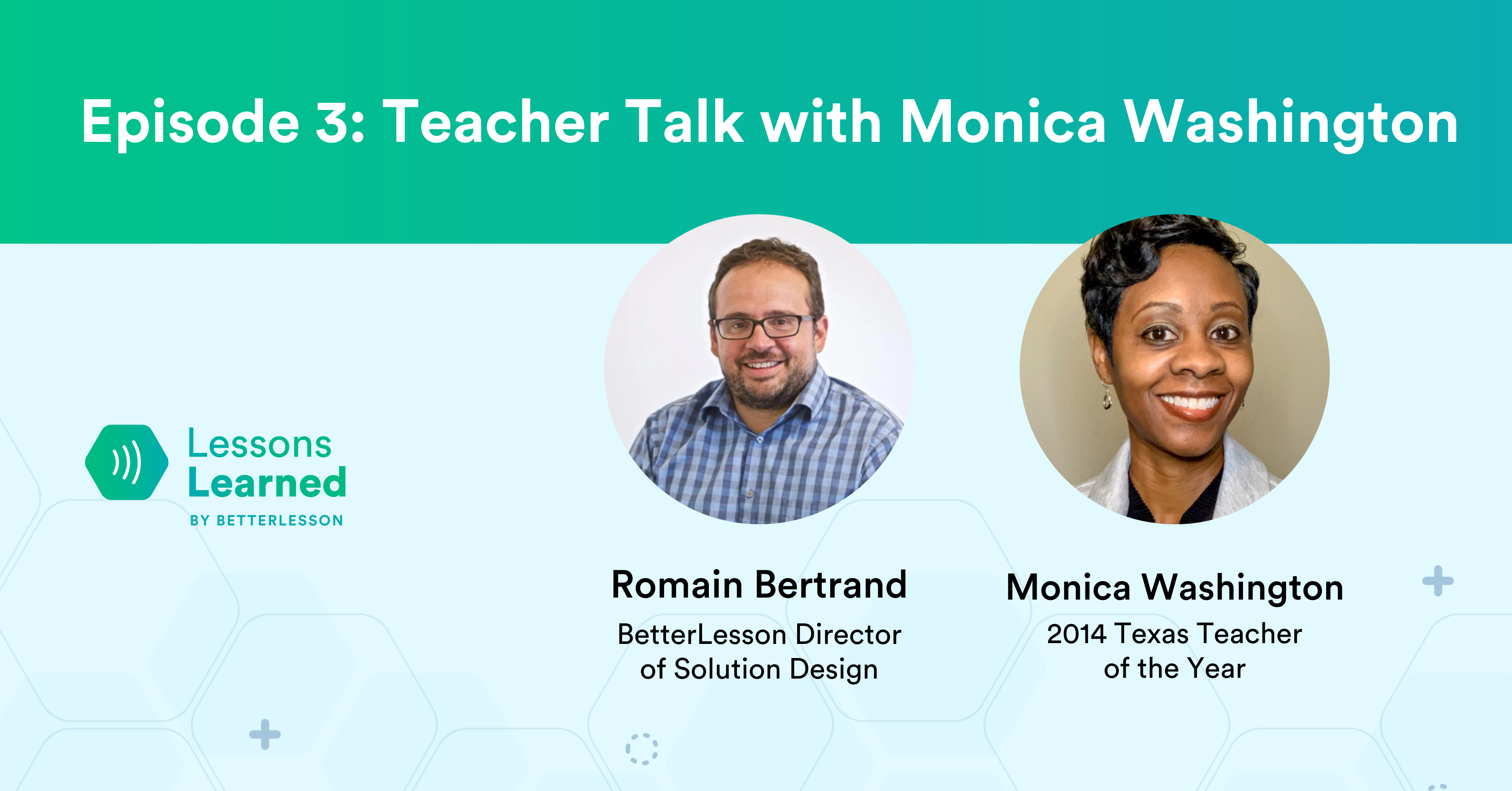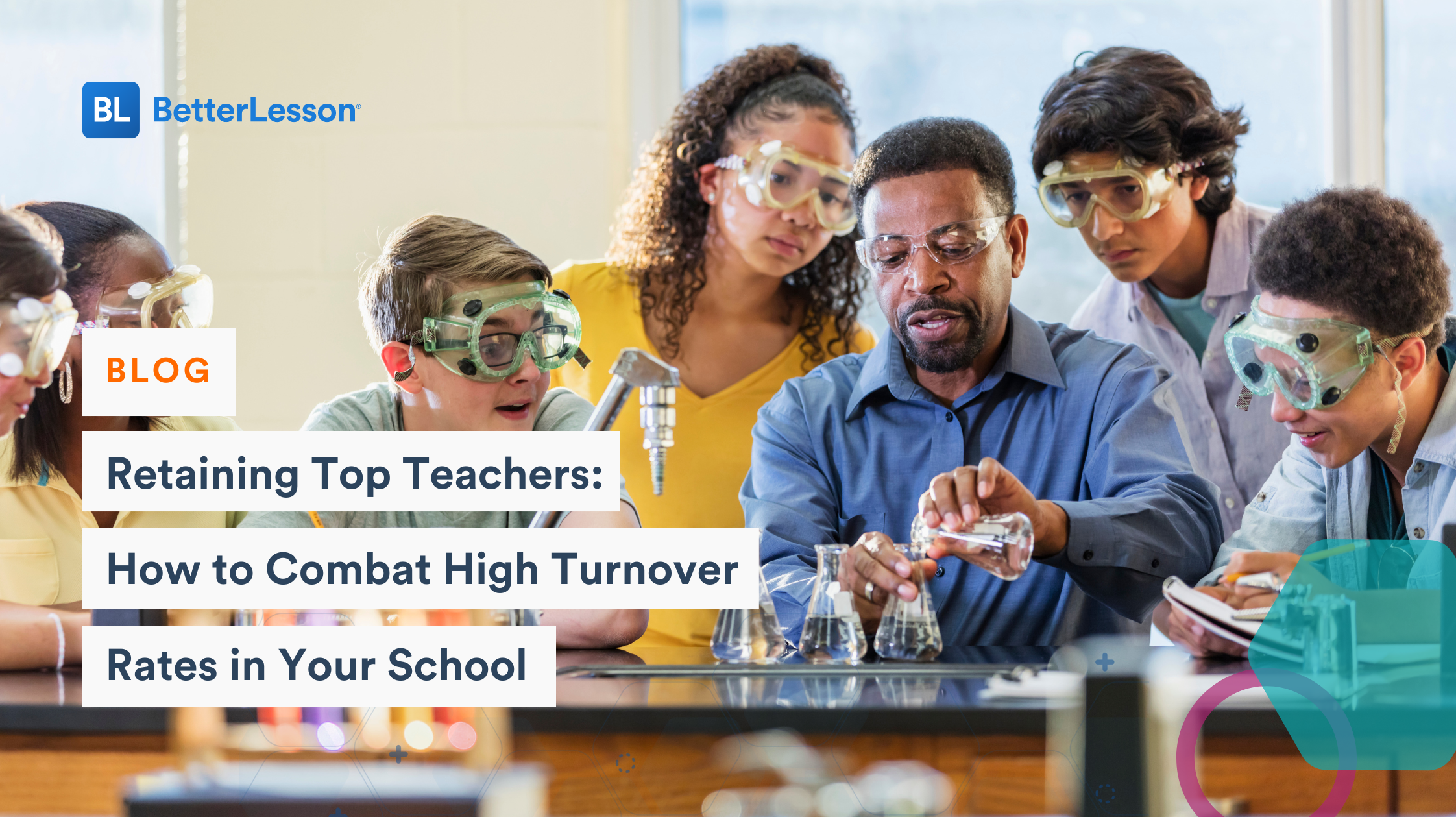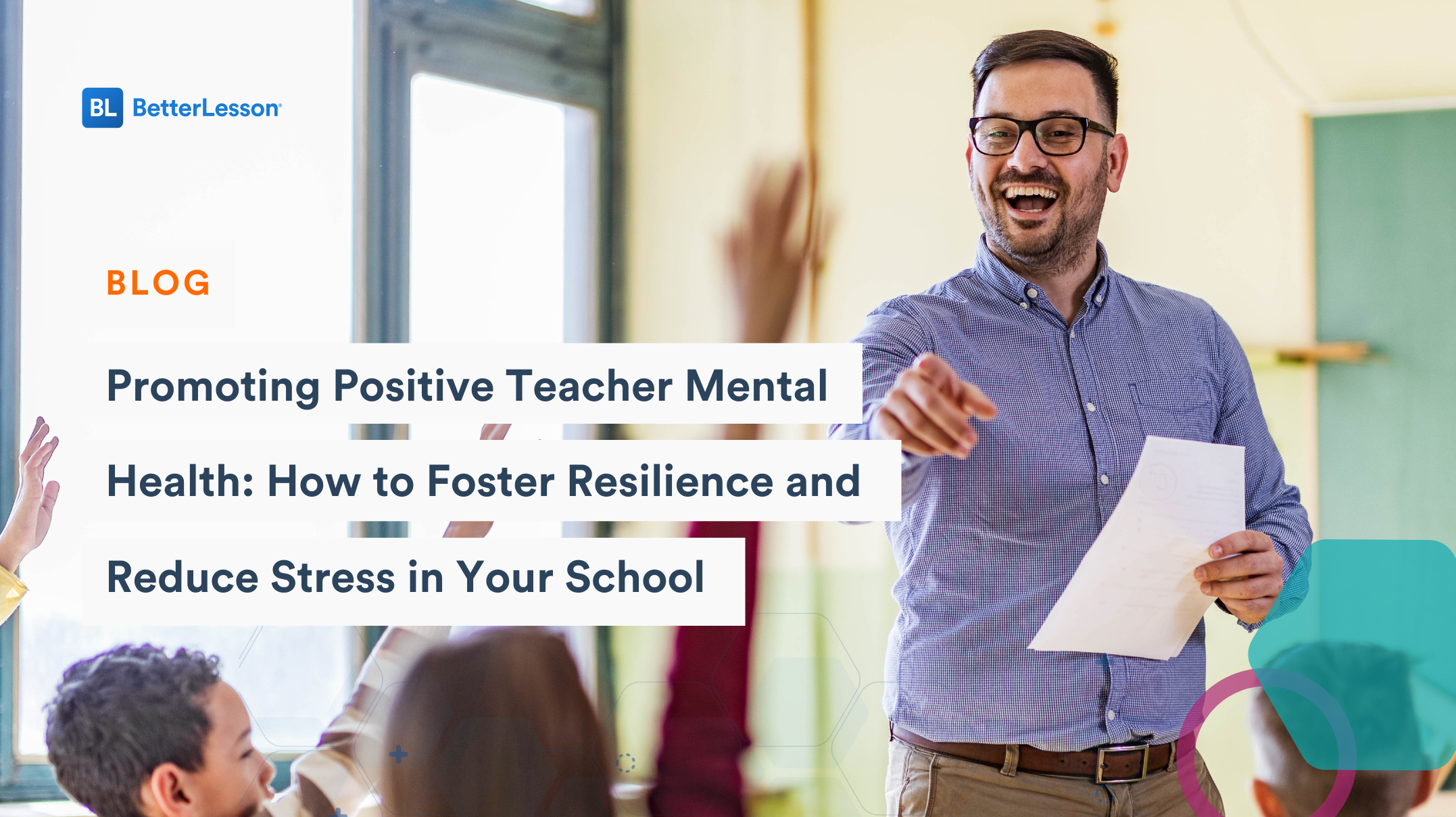Supporting teachers – those early in their career, those who’ve been in the profession for decades, and everyone in-between – is a critical component of creating impactful and sustainable schools. In December, BetterLesson hosted a webinar on Authentically Supporting Teachers to dive deeper into the why’s, what’s, and how’s of supporting all educators.
In this blog post, we will provide an overview of the key-takeaways from that webinar. From understanding the underlying causes of teacher burnout and dissatisfaction to exploring creative strategies to support teachers, this webinar offers actionable steps for school leaders looking to deepen their support systems and practices.
Why Is Teacher Support So Important?
While teacher turnover isn’t a new issue, since the COVID-19 pandemic, turnover has risen significantly, especially for early-career educators.
The causes of teacher turnover varies across school contexts; however, there are some common issues that contribute to the problem:
- Low teacher salaries & costly education preparation programs: Becoming a certified teacher through the traditional higher education route is expensive: tuition costs, certification exam fees, typically uncompensated student-teaching requirements, and more. On top of this, teacher salaries are significantly lower than similarly-educated peers in other professions. This issue is both pushing educators out of the profession and becoming a barrier to people pursuing the profession in the first place.
- Negative school culture and climate: At the school-level, the culture and climate of a district plays a huge role in teacher retention. If teachers don’t feel supported, safe, empowered, and part of a collaborative team, they are less likely to stay at that school.
- Burdensome workload: The responsibilities of a teacher are extensive: creating and executing lesson plans, grading and providing student feedback, maintaining contact with teachers, staying on top of administrative tasks and paperwork, and more. Because of this, teachers are susceptible to experiencing burnout and pursuing different career paths.
- Lack of career advancement within the classroom: Oftentimes, teachers believe that in order to advance their career path and broader their impact, they need to leave the classroom. Unfortunately, this typically means that highly-skilled teachers step away from classroom teaching. Instead, school leaders need to consider how they can shift teachers’ roles to reflect their desires for additional leadership opportunities.
Though these issues are serious and complicated, they aren’t impossible to solve! In fact, by addressing these issues, school leaders can proactively work toward creating stronger and healthier school communities.
What is the Role of Principals in Authentic Listening?
Listening is a critical role of principals and school leaders. Teachers want to stay in schools where they feel heard and seen, as professionals and as people. By taking the time to listen to teachers, principals can develop deeper and individualized understandings of how to support their teachers and how to motivate and connect with them.
There are many formal and informal equally important ways in which principals can engage in authentic listening.
Informally, principals can simply meet teachers where they’re at. For example, by joining teachers for lunch in the teachers’ lounge, principals can gain insight into their teachers’ lives and experience through casual conversation. During this necessary break-time, teachers often engage in conversations about their lives outside of school or challenges they’re having in the classroom. Taking the time to participate in these conversations helps cultivate trust and connection between principals and their teachers.
Particularly for principals in larger school districts, it can be difficult to ensure connection with each teacher through informal practices. This is where formal listening processes come in. One effective formal listening activity is Listening Circles. There are many ways to conduct Listening Circles. During a staff meeting, for example, you can divide teachers into small groups and pose various questions: How was this past week with your students? What’s a challenge you’re experiencing in your classroom? What’s a recent success you want to celebrate in your classroom? When each teacher answers in their small group, they are able to develop a sense of solidarity and community by listening to the commonalities in their experiences. When principals go around to each group to listen, they are able to build deeper trust and connection with their staff.
How Can Principals Support New Teachers?
New teachers face unique challenges as they enter the profession. One simple way that principals can support new teachers is by nonjudgmentally naming that truth: all new teachers struggle. This level of honesty can lead to two important outcomes:
First, it can combat imposter syndrome. When early-career teachers believe that their struggles are not unique to them, they are less likely to blame themselves for their challenges.
Second, it can cultivate a culture of learning. When principals position struggles and failures as inherent parts of the job, teachers are more comfortable taking risks, trying new strategies, and, perhaps most importantly, asking for help.
Another critical way to support new teachers is through mentorship. We know from research that when teachers first entering the profession work with a mentor, teacher retention increases. Part of why mentoring is so important for early-career teachers is because it provides a safe place for learning. When the mentor-mentee relationship is rooted in trust and mutual respect, new teachers can feel comfortable saying “I don’t know what I’m doing!” This level of honesty leads to early-career teachers getting the critical support they need to be successful.
How Can Principals Support Veteran Teachers?
Similarly, veteran teachers have unique needs and challenges that principals need to recognize and address. There is often an assumption that seasoned teachers are less receptive to feedback and coaching. However, when we place the blame for this issue solely on teachers, we can overlook more systemic reasons for this hesitancy. For veteran teachers who are less resistant to coaching and feedback, principals might want to ask themselves these questions: Do my teachers feel safe acknowledging their struggles and challenges? Is the expertise and experience of veteran teachers honored and recognized? Do seasoned teachers have a voice in their own professional development? Reflecting on these questions can help diagnose where school climate and structure need to be addressed in order to support experienced teachers.
One specific strategy to support veteran teachers is Inquiry Cycles. Through this process, teachers can self-identify areas of professional development based on their own interests and challenges. From there, it’s the school leader’s job to offer support and resources to guide teachers through their learning. If experienced teachers are able to direct their own professional learning, they are more likely to engage in the process.
Another way principals can support experienced teachers is through the ways in which they facilitate school- or district-level changes. For example, if a school is getting ready to launch a new curriculum, for veteran teachers, this can be a deeply disruptive transition. By both engaging with teachers throughout the process of organizational changes (i.e. soliciting and incorporating their feedback along the way) and ensuring that you as the school leader truly believe in the changes, experienced teachers are more likely to engage in the transition with an open-mind.
How Can Principals Creatively Address the Issue of Teacher Salaries
The issue of teacher salaries is bigger than an individual principal. Teacher salaries are tied up in budgetary constraints that can stem from broader institutions, like local and state education funding formulas.
While advocacy around teacher compensation and education funding is important, in the meantime, there are also more creative ways that principals can approach issues of compensation.
To raise additional un-earmarked funds, schools can consider hosting annual fundraisers. These can be events like silent auctions, marathons, or talent shows. Schools can invite both parents and families as well as leaders and business-owners in the community. Not only can these events raise funds to support teachers, they can facilitate deeper connections between the school and the community it serves.
For Title I schools, there are additional funding sources for programs like tutoring, after-school clubs, and summer academic support. These are also opportunities for teachers to earn supplemental income. However, it is important for principals to have honest conversations with teachers about their capacity to avoid burnout through these additional responsibilities.
Another way to think about the issue of compensation is to think about teacher workloads and schedules. When principals can get creative with schedules so that teachers have more time to do their work, they both get precious time back and they have more capacity to engage in additional responsibilities that could provide more compensation.
How Can Principals Avoid Toxic Positivity?
The teaching profession is often understood to be a “calling.” Most people become teachers because they care deeply about education, young people and learning. However, this passion can easily be weaponized against educators, pushing them to prioritize their career over their own well-being. How can principals encourage and cultivate that passion without inadvertently leading teachers to forfeit their own freetime?
First, principals need to ask themselves: Is it safe for teachers to say “no”? There’s an expectation that teachers will give it all for their students, but when a teacher is presented with an opportunity to join a committee, do they feel safe and supported to say “no”?
One way to develop this sense of safety is to engage teachers in “energy audits.” Through an energy audit, teachers intentionally reflect on and share their own current capacity. By listing their professional and personal responsibilities and obligations, teachers can be more thoughtful about their decisions to take on more leadership or opportunities at school. Moreover, principals can become more aware of their teachers’ capacities, which can lead to honest conversations around support needs.
Principals can also avoid toxic positivity when they model prioritizing self-care and honoring life outside of school. This gives teachers permission to do the same. It also helps to avoid teachers positioning their career as their sole identity. Teachers are more than teachers; they are family members, caregivers, parents, community members, friends, and so much more.
In addition to modeling self-care, principals need to create structures that make self-care accessible for teachers. For example, by being mindful about how different needs throughout the school year impact teachers’ workloads, principals can make strategic decisions to make workload more sustainable. If report card grades are due next week, for instance, principals might waive the requirement to submit lesson plans that week. This attentiveness to teachers’ schedules can open up necessary space for self-care.
Ultimately, it is important for principals and school leaders to approach teacher support proactively rather than reactively. When teachers reach the point of burnout, oftentimes, conversations around teacher support are too late. Instead, when principals implement thoughtful support strategies and practices in anticipation of common challenges, they create a school culture that can cultivate collaboration, resilience, and growth.
Authentically supporting teachers is a prerequisite to any successful school. However, approaching teacher support is contingent upon teacher needs, school context, and leadership capacity. BetterLesson is here to support – through instructional and executive coaching, learning walks, workshops, and thousands of on-demand courses and instructional resources – schools and districts in creating structure and protocols for authentic teacher support. Schedule a call with us today to learn more about how we can work together to create a supportive environment in your school.
Get in Touch







